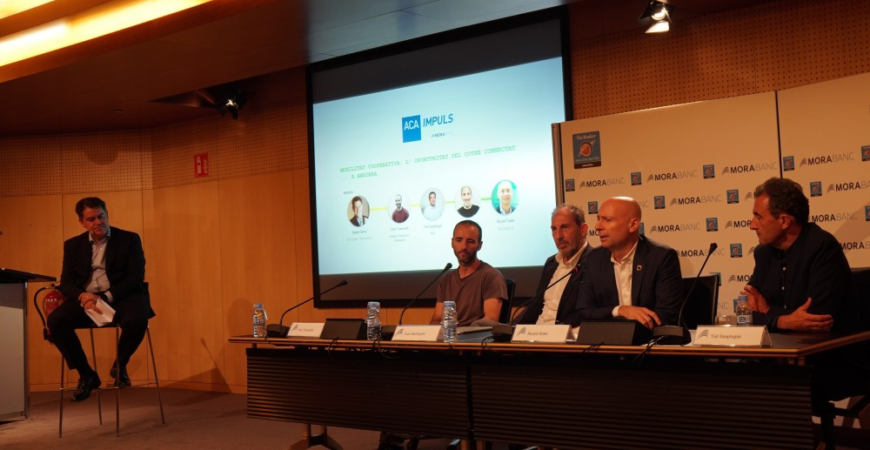On the 30th of June, the Automobile Club of Andorra (ACA) presented the Mobility Report (Imaca) where they spoke about the need to focus on having good drivers rather than imposing sanctions to offenders.
They also highlighted the need to establish new mobility services in Andorra that are already being implemented in Europe.
Next, we participated in the round table Cooperative Mobility: the opportunity of the connected car, moderated by Xavier Serra (Eclipse Partners), together with Oriol Travesset Baró (Andorra Research & Innovation), Toti Sasplugas and Ricard Soler i Kopp (Atlantis), who highlighted that Andorra has optimal characteristics and dimensions for its citizens to enjoy cooperative mobility.
You can read the article published by Bondia in catalan here
We would like to share you the English translation
The Automobile Club wants to have “better drivers” and not “more penalized drivers”
A moment of the round table held as part of the Imaca presentation.
Written by:
Meritxell Prat / Photo: ACA
The Andorran Automobile Club (ACA) today released the Mobility Report (Imaca) for 2021 and, as explained by the entity’s general secretary, Toti Sasplugas, the data on accidents and penalties due to drunk or drugged drivers is returning to pre-pandemic levels. “It is very linear, we have achieved very little,” said Sasplugas, who has defended that beyond the coercive elements such as financial fines, they want to focus more on training drivers. “We think that there is more to be done in training good drivers than in continuing to penalize with more fines or with higher fines,” he defended.
Thus, looking at the data for 2021 and 2019 (to make a more precise comparison, since 2020 was totally conditioned by confinement and mobility limitations) for sanctions in general, in 2021 17,234 sanctions were imposed, 5.18% less than in 2019 (18,176) and 8.18% less than in 2020 (18,770). In the case of penalties for driving under the influence of alcohol, sanctions rose by 0.55%, going from 183 in 2019 to 184 in 2021. In 2020 there were 133 sanctions, which in one year represents an increase of 38.35%. In this context, the age group that has the most sanctions is the one from 30 to 49 years, with 268 sanctions, above the data registered in 2020 (231) and rising towards that of 2019 (288).
Speed
Penalties for speeding also grew, with 13,678 in 2021, when in 2019 they were 13,322 (+2.67%) and in 2020 they were 14,132 (-3.21%). At this point, from the ACA it is pointed out that the speed control points (16 distributed throughout the country) and the different campaigns implemented by the police force lead to the conclusion that radars are a key element to pacify traffic.
Regarding the accident rate, in 2021 there were 496 accidents, 4.62% less than in 2019 (520), but 18.38% more than in 2020 (419). As for accidents with victims, in 2021 there were 252 and three years ago there were 283, therefore, a drop of 10.95%. On the other hand, in 2020 there were 215, being the increase in the last year 17.21%.
Sasplugas has lamented that in the last three years “we have not achieved any effect of radically lowering any of the worrying data points, we continue with worrying accident data. There is a lot of room for improvement.” However, he has acknowledged that “I don’t have the answer” as to why this improvement is not possible.
Training
Asked about the possibility of including new sanctions, such as the confiscation of the vehicle in cases of serious infractions, a fact that is being debated in committee at the General Council, he assured that “we have never been very aligned to having a single way to avoid accidents. For example, by increasing sanctions. From his point of view “it is much more important to train good drivers”. Thus, he considers that the sanctions are good because “it is what the driver understands and perceives directly, but we cannot just stay with this”, and asks to focus on training, in addition to awareness campaigns. He has spoken of “recycling” or “rethinking training models”, since he understands that “there is a lot of ground to cover”, because according to the report, “who does not drive well is the driver”. And in Andorra, as in the rest of Europe, 95% of accidents are caused by the human factor.
Without going into assessing whether it is necessary to implement the driving license based on points, review the initial training, or implement other courses such as driving on snow, he insisted that “we are more concerned with training good drivers than with putting more coercive measures”. In his opinion, with the new Traffic Code, “the ceiling of sanctions” has already been reached and therefore, “Andorrans must be better drivers, not more penalized drivers. It is the challenge to pose”.
Statistics
On the other hand, and coinciding with the 10th anniversary of the publication of the Imaca report, Sasplugas has announced that they are ending “the period of data collection” and they are passing the testimony to the Government Statistics Department. Although he has assured that they will not give up the role of analyzing data and carrying out an educational and awareness-raising tasks, he has stated that from now on “we want to have a more forward-looking vision, to propose new solutions for mobility. See what is being done abroad, where Andorra can be reflected”.
With this year as the first edition, the presentation of the report will be linked to a round table to reflect on a topic of interest linked to mobility. The one held today was entitled Cooperative Mobility: the opportunity of the connected car. The table has been moderated by Xavier Serra (Eclipse Partners), and Oriol Travesset (Andorra Research & Innovation), Toti Sasplugas, Fran Rodríguez (Net4things) and Ricard Soler (Atlantis) have participated. All the participants have agreed that Andorra is an ideal setting for the implementation of a cooperative mobility experience given its size and proximity.







